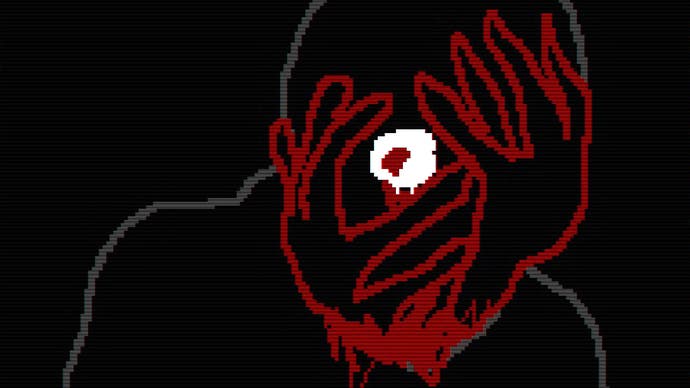When retro aesthetics wrongfoot you
Great expectations.
I can't stop thinking about Faith, that lo-fi horror game that came out a few weeks ago. Well, I call it "lo-fi" but frankly it looks old - like, really old. As though it came out on a BBC Micro 35 years ago. And that's why I keep thinking about it. It's not meant as a criticism, I'm not trashing it for looking dated. Its aesthetic is actually one of the things I find most inspired about it, because in presenting the game in that way, it does something magical: it plays on our expectations.
We look at Faith: The Unholy Trinity, to give it its full name, and think we know how it will behave. We remember BBC Micro games (I'm using the royal we here so I don't feel alone). We know what they were capable of, and the answer is not a lot. It's not their fault, technology was primitive back then - charmingly primitive, but still. So we feel safe in the knowledge that Faith can't pull one over on us. We've got it figured out.
Except, Faith does pull one on us. It shows us what we want to see while sneaking its surprises around the back. And then, boom, when it needs to, it breaks or bends what we thought we knew to land its big moments - those in-your-face depictions of disturbing horror. We didn't know it could do that; we will never forget that it did.
But there's something more going on here, too. And although I'm pin-pointing Faith, it's not the only game to do it. The deliciously dark Inscryption does, and I'm sure you'll think of more in the comments below. It's this idea of corrupting our childhoods, to put it melodramatically - to take something we think of as safe and make it unsafe, sending us reeling in the process.
Faith seems as though it comes from a time when games were harmless, or at least I remember them that way. They were wholesome, they were simple, they didn't have plots about exorcisms and demons - unless there's something to Granny's Garden that I missed. So when I see something that reminds me of games from back then, I feel warm and fuzzy and protected. I'm lulled into a false sense of security and it leaves me vulnerable.
Inscryption is rooted in this kind of thing. The whole set-up is that someone has found a game on a floppy disc and they play it and it turns out to be 100 percent cursed. A cursed object from our gaming past: it's playing with those expectations again. The whole second act of the game is a twisted version of Pokémon. I wonder how many childhood memories will that poison?
Inscryption finds a way to play with more modern expectations too. It finds a way to play around with popular tropes or templates. The card game heart of the game, for instance: instinctively, we think we know how that works, right? We've played Slay the Spire, we've played Magic: The Gathering. There are no surprises left for us. Or are there? And at no point does Inscryption seem to worry about comparisons to them, those other games. Instead it seems to almost use them, to pull on that thread so it can wrongfoot us with it.
I find this enormously exciting, and not only because I'm in awe of the imaginations out there and what they create. Partly, it's because there are loads of retro memories that could be played around with and twisted and pulled apart. I'd love to play a cursed Secret of Mana, for instance - and don't say oh play the remake.
But it's also because we live in a time where there's no escaping some of the Goliaths out there, the Magic: The Gatherings and their like, and smaller games within those genres just can't compete. So why not use their dominance to your advantage instead? Let them become the template that you can mess around with. Let them set our expectations so you can tear them apart.



